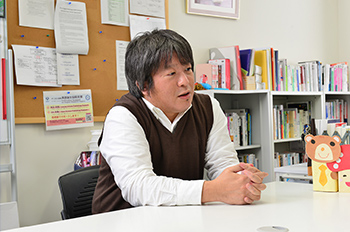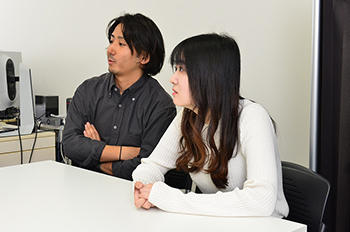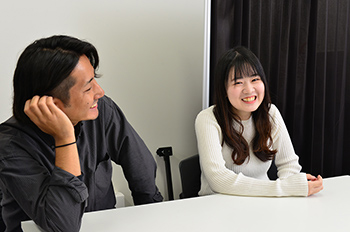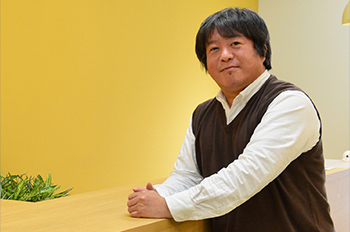Genome Information Engineering,
Bioinformatic Engineering
Associate Professor
Seno Shigeto
You have been doing research for a very long time. What gives you motivation?
Basically, I am not a very motivated person, and I think I am the type of person who does more research when there is pressure from others. Therefore, I am involved in quite a lot of collaborative research. I am able to work regardless of my motivation, and I am able to help people in other fields with their analysis, and I am also able to refresh myself by interacting with them. I am sorry that I take on so many projects that my response tends to be slow.
Our joint research mainly involves analysis of projects brought to us by professors in other departments. Recently, I have been working with a professor at the Emergency Center of The University of Osaka on RNA expression analysis related to COVID, and on omics analysis, which is the analysis of expression data, protein data, and microRNA data together. I am also working with professors at Kyoto University on expression analysis in relation to fat and foods such as soybeans and tomatoes. With the help of my master's students, I am currently working with a professor from the Department of Pharmaceutical Sciences on image analysis of muscle recovery, and with a professor from the National Institute of Information and Communications Technology on automatic recognition of microorganisms from a microscope that shows many of them. I'm also working with a breast surgeon to develop a system to check whether cancerous tissue is removed in its entirety during surgery. At any given time, I am working on about 10 to 20 joint research projects at the same time. I am sorry that the progress of my research tends to be uneven, but there are times when the knowledge gained from one research might be a hint for another one.
There are many good professors who are associated with The University of Osaka. They have faith in their own research, and they teach me a lot through their research. As I get older, the people who teach me become more and more valuable, and in that sense, universities are interesting. I think it is an environment where there are many specialists that can teach you various things you don't know.

If I were to ask you how your research has been connected to society, what would you say? How far does your research have to go before it becomes a goal?
If asked in such a straightforward manner, it becomes difficult to answer. Even when I think of new analysis methods in terms of information science, I sometimes end up thinking that the old-fashioned logistic regression is good enough. In fact, the methods developed 30 or 40 years ago are about 90% accurate. In such a situation, for me, doing joint research and being useful to researchers in other fields and companies is an easy way to connect with society. And I will do what I want to do, as my own research. Because I feel that if I don't enjoy it, it is difficult to explain the joy of research to students.
It's hard to decide on a goal for your research. For me, the reason I wanted to do information was because of artificial intelligence and automation. So, in the end, I would like to secretly create a system that can automatically do the kind of analysis that I am asked to do in collaborative research, and gets it done while I'm sleeping.

When you get stuck in your research,
do you have any ways to refresh or get through it?
It's like doing another collaborative research project to refresh your research. Even though many things are going wrong, I feel better when there is one thing that is going well. I try my best not to get stressed out.
As for how to refresh myself when I get stuck in my research, I was unable to do so when I was a student. When I was a student, I couldn't do that. I came to school to study and gain knowledge, but I couldn't decide on my own research theme before I even knew the full scope of the field. It's really difficult to decide what to research when you are just starting your studies. It's also really hard for students to change their research theme after they have decided on it, because they can't do it by themselves. You have to deal with the work you have to do even though you can't do it.
So, on the other hand, I think the main thing is to find out what you want to do. Do the research you want to do. Find the problem that you really want to solve and solve it, rather than the data you receive. Do it as if you are not being forced to do it. If you do this, you can bypass a dead-end situation. You become able to decide on the theme on your own, and thus able to bypass a dead-end, so I think that's important. . It's a lot of work, though.
Also, you may also hear this a lot, but I think it is important to take care of social connections outside of the laboratory. Especially nowadays, with the COVID-19 epidemic, students tend to lose communication with each other, making it difficult for them to talk and relieve stress, so I want you to take care of social connections outside of your lab.
As you will find out as you continue your research, research basically does not go well. It is important to reduce stress, but the basic premise is that you need to spend a certain amount of time to do it. So, the most important thing is to go to bed early and get up early properly. Get up in the morning, do your research, and sleep properly at night. For example, I think there are very few university students who study from 9:00 a.m. to 5:00 p.m., the same amount of time they spent studying in junior high and high school, so various results will start to show if you do that much.










